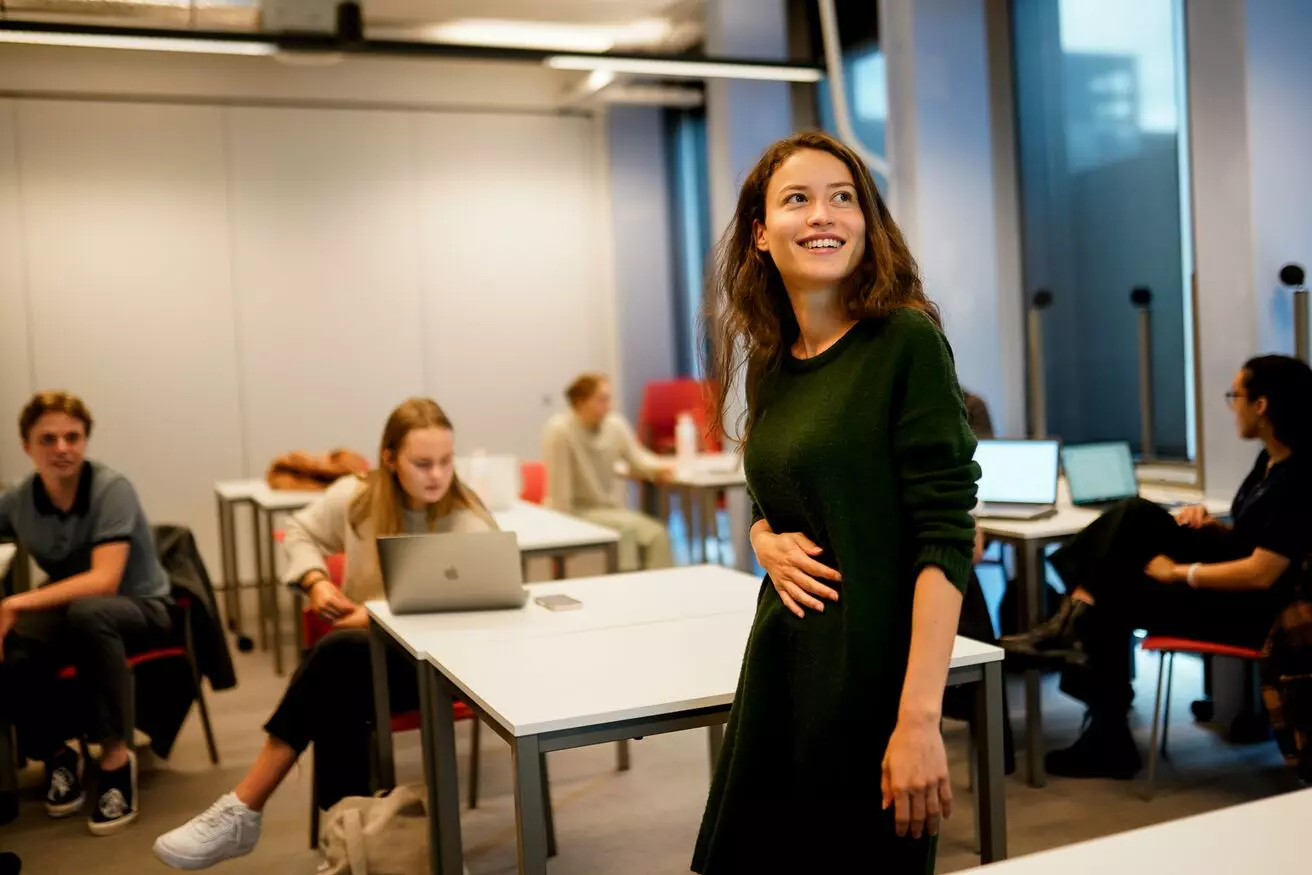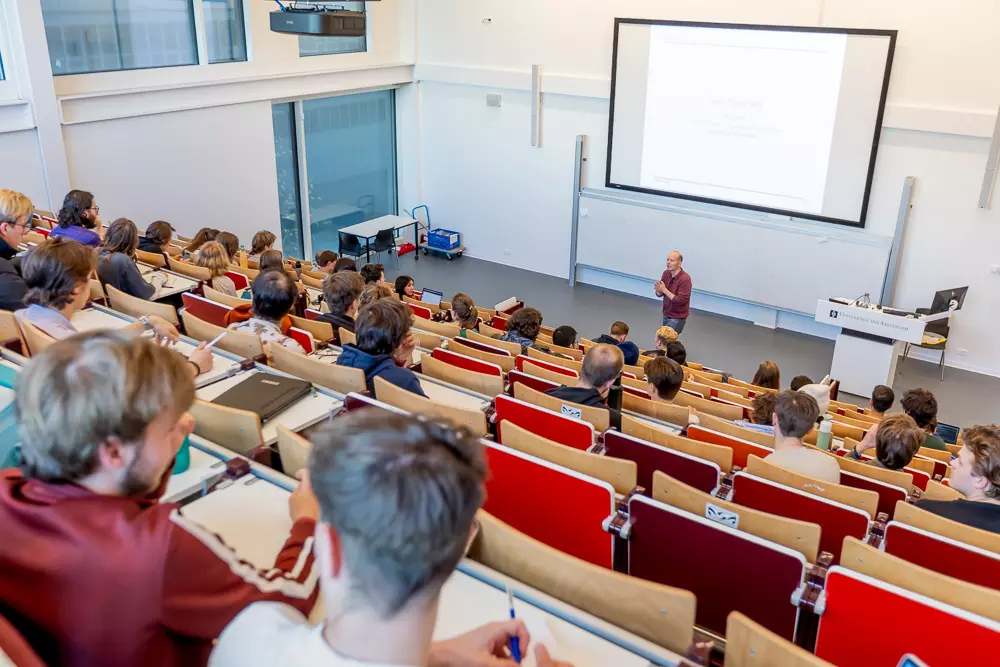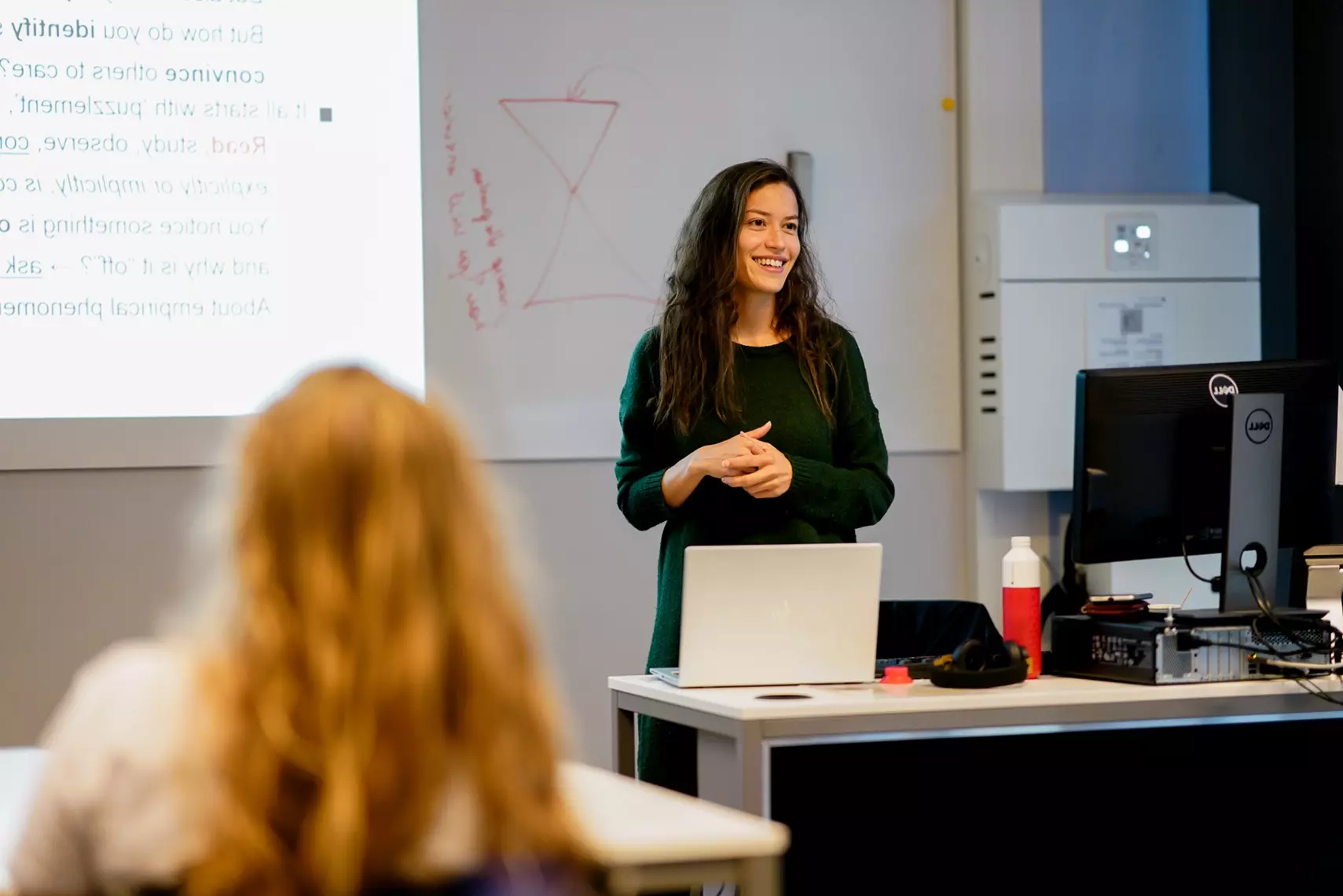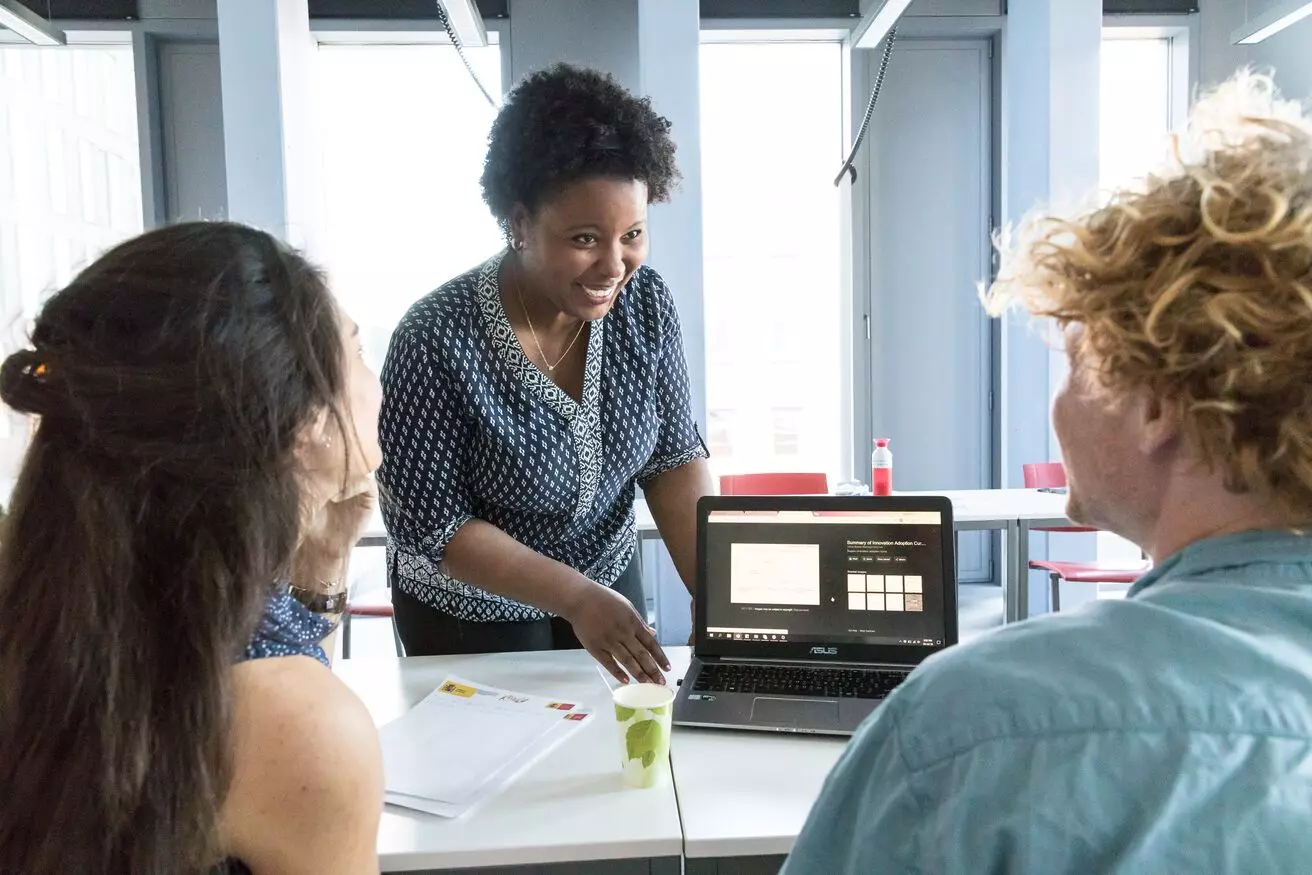
Are you looking for a challenging job in a dynamic setting? Would you like to help our students bridge the gap between science and society? Do you want to further enhance your teaching skills whilst extending your UvA network and work on your personal development plan? The program group Brain and Cognition (Psychology) of the Faculty of Social and Behavioral Sciences is looking for a lecturer to for our master’s track Brain & Cognition in Society.
Lecturer Brain & Cognition
- Faculty of Social and Behavioural Sciences
- 14218
- Master's
- €3.378 - €5.331
- Minimum 30 hours
- Closes on06-07-2025

Are you looking for a challenging job in a dynamic setting? Would you like to help our students bridge the gap between science and society? Do you want to further enhance your teaching skills whilst extending your UvA network and work on your personal development plan? The program group Brain and Cognition (Psychology) of the Faculty of Social and Behavioral Sciences is looking for a lecturer to for our master’s track Brain & Cognition in Society.
Lecturer Brain & Cognition
- Faculty of Social and Behavioural Sciences
- 14218
- Master's
- €3.378 - €5.331
- Minimum 30 hours
- Closes on06-07-2025
Working at the UvA
Be part of UvA Brain & Cognition
Our program group facilitates the education in the specialisations ‘Brain and Cognition’ (English) and ‘Clinical Neuropsychology’ (Dutch) as a part of the bachelor Psychology at the UvA, as well as interdisciplinary bachelors (Psychobiologie, Beta Gamma). We also teach in the master tracks ‘Brain and Cognition in Society’ (English) and ‘Klinische Neuropsychologie’ (Dutch), as well as the research masters Psychology and Brain and Cognitive Sciences.
The Brain and Cognition group focuses on understanding human cognition and adaptive behavior in both health and disease. In order to do so, our research efforts are aimed at a wide range of questions to ensure that knowledge about the cognitive architecture of adaptive behavior is embedded in a system-level understanding of the brain and will impact individuals’ wellbeing. This implies that we combine purely scientific curiosity driven questions with broader societal questions. These questions can be grouped in two interrelated major themes.
- Development of advanced theories and cognitive models to improve the quality of inferences about cognitive processes and adaptive behavior.
- Understanding and influencing the causes (e.g., brain structure, brain function, cognitive architecture, environmental) and consequences (cognition, mental health, well-being) of neurological compromise and neurodiversity.

Working at the UvA
Be part of UvA Brain & Cognition
Our program group facilitates the education in the specialisations ‘Brain and Cognition’ (English) and ‘Clinical Neuropsychology’ (Dutch) as a part of the bachelor Psychology at the UvA, as well as interdisciplinary bachelors (Psychobiologie, Beta Gamma). We also teach in the master tracks ‘Brain and Cognition in Society’ (English) and ‘Klinische Neuropsychologie’ (Dutch), as well as the research masters Psychology and Brain and Cognitive Sciences.
The Brain and Cognition group focuses on understanding human cognition and adaptive behavior in both health and disease. In order to do so, our research efforts are aimed at a wide range of questions to ensure that knowledge about the cognitive architecture of adaptive behavior is embedded in a system-level understanding of the brain and will impact individuals’ wellbeing. This implies that we combine purely scientific curiosity driven questions with broader societal questions. These questions can be grouped in two interrelated major themes.
- Development of advanced theories and cognitive models to improve the quality of inferences about cognitive processes and adaptive behavior.
- Understanding and influencing the causes (e.g., brain structure, brain function, cognitive architecture, environmental) and consequences (cognition, mental health, well-being) of neurological compromise and neurodiversity.
All about this vacancy
What are you going to do
We offer a lecturing position (lecturer 4/docent 4). You will teach courses which have already been developed and you will supervise students during their master internship and thesis projects. The master thesis topics need to be a fit with the teaching program and are preferably bridging fundamental knowledge to societal impact. The internships will be caried out externally but are supervised by you. You will coach and guide them throughout their projects with external partners, and monitor their academic progress.
You will:
- Coordinate existing courses (i.e. communicating with the students, manage the CANVAS page of the course)
- Lecture and supervise workgroups in existing courses
- Grade course assignments and exams
- Design and supervise master thesis projects
- Supervise external internship projects
What do you have to offer
You have a developed skillset in (neuro)cognitive methods such as eye tracking, EEG or fMRI. You feel well at home with the connection between cognition, behaviour and societal issues. You enjoy supervising (international) students, and guiding the students in their master towards their future careers. You want to develop yourself as a teacher, and reflect on your own skills. You have excellent written communication and social skills and you can work well in a team.
You have experience with translating theoretical and methodological knowledge from the field of brain and cognition to address issues in society. You know how to set up applied studies and translate empirical findings into practical advice.
Your experience and profile:
- A PhD or Msc in cognitive psychology, cognitive neuroscience or related field
- Experience with knowledge utilisation within the field of brain and cognition
- Excellent English language skills and proficiency in Dutch
- Experience with (neuro)cognitive methods such as eye tracking, EEG or fMRI
- Preferably experience with individual supervision of students
- Preferably a BKO (teaching skills certification) or the willingness to enter a BKO trajectory
What else do we offer you
We offer a stimulating and interdisciplinary working environment with varied tasks and ample room for individual initiative and professional development – within an inspiring organization. Working at the University of Amsterdam means working in a dynamic, independent, creative, innovative, and international environment with an open atmosphere and strong engagement with society and the city of Amsterdam.
This is a temporary position for four years, with a two-month probationary period, for 0.8 FTE (30,4 hours per week). This is the average number of hours you work per week; there are periods when more hours are required due to grading, among other things. You can compensate these hours later, when the teaching is less intensive.
During the first year of your appointment, 20% of your teaching hours are reserved for training and development. In the years after this will be 10% of your teaching hours.
We refer to this combination of work and professional development as the Lecturer Development Program (DOP). During your four-year contract, you will follow training sessions together with other teachers and obtain the University Teaching Qualification (BKO). The goal of the DOP is to optimize your position in the labor market (employability and opportunities) after the temporary employment.
All about this vacancy
What are you going to do
We offer a lecturing position (lecturer 4/docent 4). You will teach courses which have already been developed and you will supervise students during their master internship and thesis projects. The master thesis topics need to be a fit with the teaching program and are preferably bridging fundamental knowledge to societal impact. The internships will be caried out externally but are supervised by you. You will coach and guide them throughout their projects with external partners, and monitor their academic progress.
You will:
- Coordinate existing courses (i.e. communicating with the students, manage the CANVAS page of the course)
- Lecture and supervise workgroups in existing courses
- Grade course assignments and exams
- Design and supervise master thesis projects
- Supervise external internship projects
What do you have to offer
You have a developed skillset in (neuro)cognitive methods such as eye tracking, EEG or fMRI. You feel well at home with the connection between cognition, behaviour and societal issues. You enjoy supervising (international) students, and guiding the students in their master towards their future careers. You want to develop yourself as a teacher, and reflect on your own skills. You have excellent written communication and social skills and you can work well in a team.
You have experience with translating theoretical and methodological knowledge from the field of brain and cognition to address issues in society. You know how to set up applied studies and translate empirical findings into practical advice.
Your experience and profile:
- A PhD or Msc in cognitive psychology, cognitive neuroscience or related field
- Experience with knowledge utilisation within the field of brain and cognition
- Excellent English language skills and proficiency in Dutch
- Experience with (neuro)cognitive methods such as eye tracking, EEG or fMRI
- Preferably experience with individual supervision of students
- Preferably a BKO (teaching skills certification) or the willingness to enter a BKO trajectory
What else do we offer you
We offer a stimulating and interdisciplinary working environment with varied tasks and ample room for individual initiative and professional development – within an inspiring organization. Working at the University of Amsterdam means working in a dynamic, independent, creative, innovative, and international environment with an open atmosphere and strong engagement with society and the city of Amsterdam.
This is a temporary position for four years, with a two-month probationary period, for 0.8 FTE (30,4 hours per week). This is the average number of hours you work per week; there are periods when more hours are required due to grading, among other things. You can compensate these hours later, when the teaching is less intensive.
During the first year of your appointment, 20% of your teaching hours are reserved for training and development. In the years after this will be 10% of your teaching hours.
We refer to this combination of work and professional development as the Lecturer Development Program (DOP). During your four-year contract, you will follow training sessions together with other teachers and obtain the University Teaching Qualification (BKO). The goal of the DOP is to optimize your position in the labor market (employability and opportunities) after the temporary employment.
Your place at the UvA
Our team
The Brain and Cognition department is a diverse department with research spanning topics from the anatomy of the brain to the autonomy of the individual. It is a vibrant group of enthusiastic lecturers and researchers (see B&C UvA website). Within psychology we provide coursers for both the bachelor and (research)masters. We have two specialized bachelor tracks: Brain and Cognition and Clinical Neuropsychology and two specialized master tracks: Brain and Cognition in Society and Clinical Neuropsychology. Moreover we are active within the Research Master Psychology, bachelor Psychobiology (FNWI) and the interdisciplinary Research Master program Brain and Cognitive Sciences.
More about the UvA
The University of Amsterdam is ambitious, creative and committed. An inspiration to students since 1632, a vanguard player in international science and a partner in innovation.
The University of Amsterdam is the largest university in the Netherlands, with the broadest range of courses on offer. An intellectual hub with 42,000 students, 6,000 staff and 3,000 PhD students. Connected by a culture of curiosity.
Your place at the UvA
This is where you will be working
Our team
The Brain and Cognition department is a diverse department with research spanning topics from the anatomy of the brain to the autonomy of the individual. It is a vibrant group of enthusiastic lecturers and researchers (see B&C UvA website). Within psychology we provide coursers for both the bachelor and (research)masters. We have two specialized bachelor tracks: Brain and Cognition and Clinical Neuropsychology and two specialized master tracks: Brain and Cognition in Society and Clinical Neuropsychology. Moreover we are active within the Research Master Psychology, bachelor Psychobiology (FNWI) and the interdisciplinary Research Master program Brain and Cognitive Sciences.
More about the UvA
The University of Amsterdam is ambitious, creative and committed. An inspiration to students since 1632, a vanguard player in international science and a partner in innovation.
The University of Amsterdam is the largest university in the Netherlands, with the broadest range of courses on offer. An intellectual hub with 42,000 students, 6,000 staff and 3,000 PhD students. Connected by a culture of curiosity.
Important to know
Your application & contact
Are you interested in working in the Brain & Cognition department? Then please submit your CV and motivation letter before July 6, 2025 via the red button. We will schedule the first round of interviews on 14/15 July.
If you have further questions about this vacancy you can contact Marte Otten at [email protected]
Diversity, Equity & Inclusion
As an employer, the UvA maintains an equal opportunities policy. We value diversity and are fully committed to being a place where everyone feels at home. We nurture inquisitive minds and perseverance and allow room for persistent questioning. With us, curiosity and creativity are the prevailing culture.
Important to know
Your application & contact
Are you interested in working in the Brain & Cognition department? Then please submit your CV and motivation letter before July 6, 2025 via the red button. We will schedule the first round of interviews on 14/15 July.
If you have further questions about this vacancy you can contact Marte Otten at [email protected]
As an employer, the UvA maintains an equal opportunities policy. We value diversity and are fully committed to being a place where everyone feels at home. We nurture inquisitive minds and perseverance and allow room for persistent questioning. With us, curiosity and creativity are the prevailing culture.
Other interesting vacancies for you

Lecturer in International and Transnational Criminal Law
- Amsterdam Law School
- €3.378 - €5.331
- Closes on23-06-2025
- University
- 32 - 38 hours
Have you completed, or about to complete, a Master's degree in International Criminal Law or in adjacent fields of (international) law, and are you enthusiastic about teaching and developing your skills as a professional in higher education? Are you a reliable team player and do you want to share your knowledge with our LLM students?
View vacancy

Lecturer Digital Marketing
- Faculty of Economics and Business
- €4.537 - €7.056
- Closes on31-08-2025
- Master's
- 38 hours
The Amsterdam Business School invites applications for a teaching position in the department of Marketing. The appointment will be for a full-time or part-time position as (Senior) Lecturer in Digital Marketing. We seek candidates with strong teaching credentials who can coordinate, design, and deliver courses in our BSc, MSc, and executive programs. The preferred start date is 1 August 2025; applications will be reviewed on a rolling basis, and the position will be filled once a suitable candidate is found.
View vacancy

Junior Lecturer Marketing
- Faculty of Economics and Business
- €3.378 - €5.331
- Closes on31-08-2025
- Master's
- 38 hours
The Amsterdam Business School invites applications for a teaching position in the department of Marketing. The appointment will be for a full-time or part-time position as Junior Lecturer. We seek candidates who are committed to excellence in teaching Marketing courses in our BSc, MSc, and executive programs. The preferred start date is 1 August 2025; applications will be reviewed on a rolling basis, and the position will be filled once a suitable candidate is found.
View vacancy
Other interesting vacancies for you

Lecturer in International and Transnational Criminal Law
- Amsterdam Law School
- €3.378 - €5.331
- Closes on23-06-2025
- University
- 32 - 38 hours
Have you completed, or about to complete, a Master's degree in International Criminal Law or in adjacent fields of (international) law, and are you enthusiastic about teaching and developing your skills as a professional in higher education? Are you a reliable team player and do you want to share your knowledge with our LLM students?
View vacancy

Lecturer Digital Marketing
- Faculty of Economics and Business
- €4.537 - €7.056
- Closes on31-08-2025
- Master's
- 38 hours
The Amsterdam Business School invites applications for a teaching position in the department of Marketing. The appointment will be for a full-time or part-time position as (Senior) Lecturer in Digital Marketing. We seek candidates with strong teaching credentials who can coordinate, design, and deliver courses in our BSc, MSc, and executive programs. The preferred start date is 1 August 2025; applications will be reviewed on a rolling basis, and the position will be filled once a suitable candidate is found.
View vacancy

Junior Lecturer Marketing
- Faculty of Economics and Business
- €3.378 - €5.331
- Closes on31-08-2025
- Master's
- 38 hours
The Amsterdam Business School invites applications for a teaching position in the department of Marketing. The appointment will be for a full-time or part-time position as Junior Lecturer. We seek candidates who are committed to excellence in teaching Marketing courses in our BSc, MSc, and executive programs. The preferred start date is 1 August 2025; applications will be reviewed on a rolling basis, and the position will be filled once a suitable candidate is found.
View vacancy

Don't miss out on your dream job!
Sign up for a job alert and you'll receive automatic updates about new and relevant vacancies.

Don't miss out on your dream job!
Sign up for a job alert and you'll receive automatic updates about new and relevant vacancies.
This website uses cookies
We, and third parties, use cookies on our website. We use cookies to ensure that our website functions properly, to store your preferences, to gain insight into visitor behavior, but also for marketing and social media purposes (showing personalized advertisements). By clicking 'Accept', you agree to the use of all cookies. In our Cookie Statement. you can read more about the cookies we use and save or change your preferences. By clicking 'Refuse' you only agree to the use of functional cookies.
